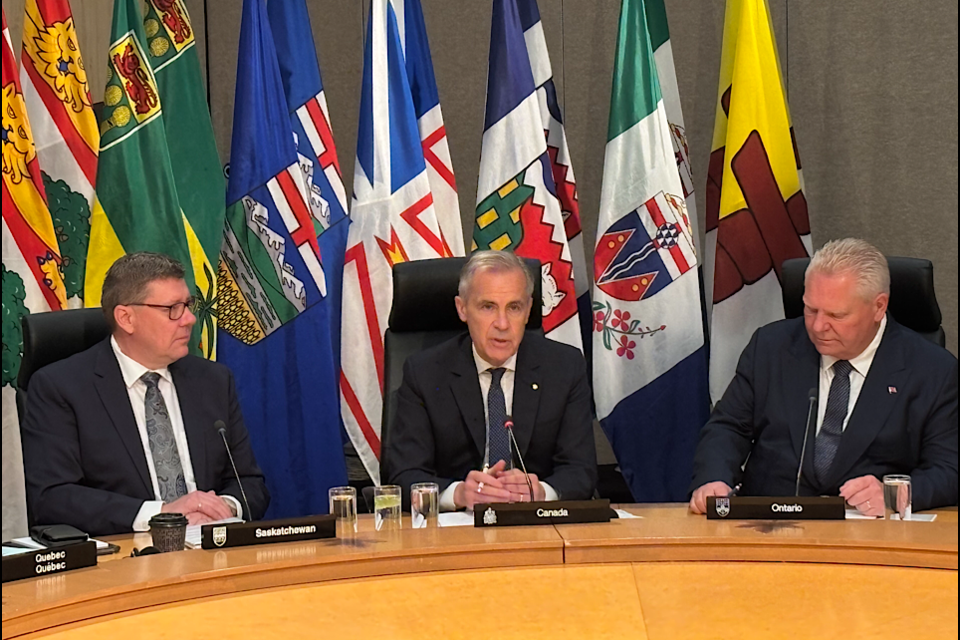SASKATOON - The first First Ministers Meeting held in Saskatchewan in 40 years is now under way.
Prime Minister Mark Carney and the Premiers of the 10 provinces and three Territories (excepting B.C.’s David Eby, who is in Asia) arrived at TCU Place for what is expected to be a day-long meeting focused mainly on nation-building projects and how to get those approved. It also comes amid a push to remove interprovincial trade boundaries with Ontario signing a deal with Saskatchewan, as well as with Prince Edward Island and Alberta, the previous day.
Carney provided opening remarks at the start of the conference Monday morning. Carney noted during the time of the last First Ministers meeting in Regina 40 years earlier, it was the run-up to the free trade deal with the United States. He pointed to the trading relationship they had had with the U.S.A. with USMCA.
“But that situation has changed. We're in the process of redefining our relationship with the United States. That's ongoing. We're working very much in partnership around this table in terms of our priorities and how to define it but also taking matters very much into our own hands…
“That's what this meeting is about. Building a stronger Canadian economy. Building one Canadian economy and I really want to salute the leadership around this table. I can't keep up with the flurry of announcements of free trade agreements between the provinces across the country. The federal government will do its part to table legislation very shortly to eliminate federal barriers to interprovincial movement of goods and people, and also to put in place an ability to advance the projects of national interest. We have seen a lot of leadership around this table approving truly nation-building projects. This is just the start. This is just the start of what Canadians expect and what they deserve.”
In his opening remarks Saskatchewan Premier Scott Moe paid tribute to those fighting the wildfires, and spoke of the recent collaboration among the provinces and federal government to share resources to fight the fires.
“It’s that ability for us to be more than the sum of our parts in Canada that is the approach that I hope each of us takes to our meetings today,” said Moe
“I think when we look at the collaboration in which we come together to protect our communities, our homes, and our families across this country year in and year out, we approach this conversation today in the weeks and months and years ahead, in building towards those goals of strengthening that economy so it is leading the G7 — strengthening our opportunity and providing an opportunity for us as Canadians to become a global energy superpower. Canadians will be well-served by the work that we collectively are doing here today.”
Moe reiterated that there was an opportunity “to unite this nation, and to really seize the opportunity that I see before us as Canadians.”
The mood among the First Ministers going into the meeting was optimistic, with Premier Doug Ford even singing to reporters "love is in the air" as he entered the conference room.
"We're going to make real, positive changes," Ford told reporters. "No longer is it going to take years and years to get shovels in the ground, no matter if it's critical minerals or an oil pipeline across the country ... we're going to be an energy superpower around the world."
But whether there is harmony among the First Ministers on topics like pipelines remains to be seen. One issue is whether the final communique issued later today will be enough to satisfy Alberta Premier Danielle Smith's list of demands which include getting a pipeline built.
"I hope so, I think there seems to be an appetite to talk about getting pipelines built," said Smith when asked by reporters.
"The problem is unless we address the nine terrible policies that have damaged investor confidence, we're not going to get the proponents coming forward with major investment. So I think it's got to be a two track process. Let's get the commitment that we are going to build a new pipeline, and then I'll have to work with the Prime Minister to repeal or significantly amend the policies."
In a post on the X platform Monday morning Smith outlined her expectations going into today’s meeting:
“Yesterday, I met with Prime Minister @MarkJCarney. While there appears to be a desire to move forward with new projects, including a west coast bitumen pipeline, a clear commitment is needed to act on barriers that have held back private investment, such as the production cap, the tanker ban, C-69, and the net zero power regulations. Without movement on these issues, there will be no significant investment in oil and gas, leaving $14 trillion of value in the ground to the profound detriment of all Canadians.”
“We’ll need to see what the economic impact was for Quebec,” was the response of Quebec Premier Francois Legault when asked what the appetite and willingness was for pipelines.
“If there’s a project going into Quebec, we’ll study it. That’s all I said.”
As for how far premiers might be willing to go to satisfy Smith’s demands, Legault answered that it was Prime Minister Carney, not Smith, that invited him to the meeting.
“He asked us to bring economic projects, so we have many economic projects in electricity, in critical minerals,” said Legault. “We’ll see with Mark Carney what is he ready to finance or help or to push.”




